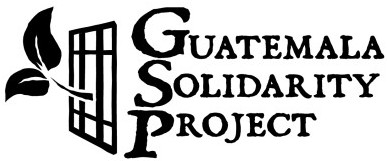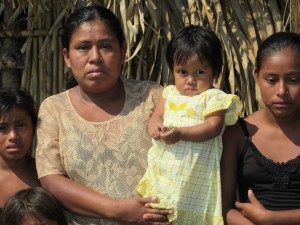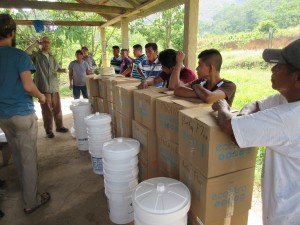June 15, 2015
The Guatemala Solidarity Project is urgently requesting donations to primarily support Q’eqchi’ Maya communities in the Polochic Valley which were violently evicted in 2011. The 7-minute video below gives a glimpse of what these evictions looked like. Not only were the humble homes of Q’eqchi’ peasants burned to the ground, but corn, beans and other subsistence crops were also destroyed.
As a result, the vast majority of children from these communities are suffering from chronic malnutrition. Several people have died of illnesses related to starvation. After the Inter American Court of Human Rights ruled in favor of the communities, the government promised to give them land. Four years later thousands of people remain without land or even clean drinking water.
On May 6, 2015, GSP activists Daisy McCoy and Palmer Legare travelled to Rio Frio, one of the communities which was attacked in 2011. We went with Dominga Caal Maquin and her daughter Dominga Caal Caal (pictured below). Dominga had just left the hospital after several weeks of treatment for severe acute malnutrition. The majority of children in Rio Frio and most GSP partner communities suffer from chronic malnutrition.
The short term effects of malnutrition are severe and can include death. Several people have died of starvation and related illnesses since the communities were evicted in 2011. Children who survive chronic malnutrition suffer from extreme long term consequences. Weakened immune systems, stunted growth, weak bones, decreased IQ, learning disabilities, diabetes, heart disease, kidney damage, and decreased physical capacity for work as an adult are just some of the life-long effects of chronic malnutrition even for people who are eventually able to consistently access sufficient nutrients after surviving chronic malnourishment.
Water-borne illnesses are causing significant injury to members of these communities. Often the small amount of nutrients parents are able to give their children are negated by water-borne illnesses. Children and the elderly are also most vulnerable to mosquito-borne illnesses such as malaria. Families are unable to purchase water filters and mosquito nets to protect their children and elderly. The government and wealthy “land owners” continue to threaten and exploit communities, making it impossible for them to access such basic goods.
On Friday, May 29, 2015, the Guatemala Solidarity Project delivered 28 water filters to communities in the Polochic Valley. These filters were evenly distributed among seven communities which have faced continued repression for the government and “land owners.” We are confident that these filters will have a very positive impact on the health of community members, especially children. However, each water filter should ideally be used by just one family. In this case, thousands of people will be collectively operating and sharing 28 water filters. We need you to take action now by making a donation to the GSP. Because we are a volunteer-run organization, all funds (other than bank transfer fees) go directly to our partners in Guatemala. Donations are also tax deductible in the US.
The GSP is also excited to be supporting an innovative sustainable organic agro-ecological model of agricultural production in partner communities. This model will allow families to maximize production in small plots and make their own organic fertilizer, pesticides and herbicides. An emphasis is placed on minimizing environmental impact and. Hundreds of families have discussed their interest with the GSP and need your support to purchase seeds, seedlings, low-impact mechanical pumps and other goods to start this important work! The video below was filmed in June, 2015 in the small plot of a family that has already put this system into place. We will be producing more detailed videos with English subtitles and more information in the coming months.
For more information about the violent evictions of our partner communities in the Polochic Valley we suggest the following video from Caracol Productions with English subtitles (31 minutes):


